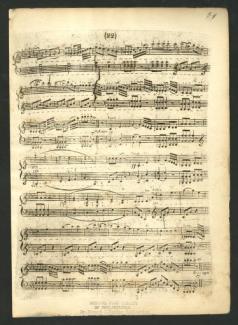Event
Penn Colloquium Series: K.E. Goldschmitt
K.E. Goldschmitt
The Department of Music’s main Colloquium Series showcases new research by leading scholars across the fields of musicology, ethnomusicology, music theory, and composition both in the United States and internationally. Music Colloquia take place on Tuesdays at 5:15 in Lerner Center, Room 102. The Lerner Center is located at 201 S. 34th Street, Philadelphia Pa, 19104-6313. See here for the full calendar of the 2019-2020 Colloquia Series.
K.E. Goldschmitt, Assistant Professor of Music, Wellesley College
From Moonlight to Fado Bicha: The Transnational Queerness of ‘Cucurrucucú Paloma’ on Stage and Screen
For at least 20 years, scholars, critics, and music fans have taken note of the affective power of Caetano Veloso's recording of "CucurrucucúPaloma" in international queer cinema. The creative choices that have gone into featuring the song in key moments of emotional gravitas on stage and screen latch onto fragments of the song’s extended meaning in audiovisual media, whether it be in homage or as a sendup of masculinity. Prior to Veloso’s performance of it, “Cucurrucucú Paloma” had an extended life incomédias rancheras, a style of musical film from the “Golden Age” of Mexican Cinema, where it was often performed by women. This presentation traces the meanings and affective content of the song’s prominence in queer screen media and performance, focusing in particular onMoonlight(2016) and the performed repertoire of Fado Bicha, an influential queer fado duo from Lisbon. It argues that when the song appears, the artists in question are latching onto fragments of the song’s extended meaning in audiovisual media, especially as regards Veloso’s vocal timbre and changes in the song’s arrangement. Contextualizing this musical choice allows us further insight into how a seemingly obscure musical cue can deepen the meaning of performance for knowledgeable publics.
About K.E. Goldschmitt
K.E. Goldschmitt is a popular music scholar of Brazilian, Luso-African, and Latin American cultures. Their first book project, Bossa Mundo: Brazilian Music in Transnational Media Industries (2020: Oxford University Press), studies the moments of popular breakthrough for Brazilian music among English-speaking publics in the United States and United Kingdom. From the late 1950s through the late 2010s, the book and covers such genres as bossa nova, cool jazz, easy listening, jazz fusion, world music, hip-hop, and more. Their second major ethnographic project investigates Pan-African musical movements among lusophone (Portuguese-speaking) populations.Goldschmitt's research also focuses on the role music plays in audiovisual media such as film, television, advertising, and video games. Their publications on these topics include articles on Brazilian music in a Nike Ad for the 2006 World Cup, mobile music distribution in the Brazilian music industry, a musical meme in film soundtracks and film trailers, and samba and funk in Brazilian gangster films. They also have an interest in digital music cultures, which has led to a co-authored essay on streaming music recommendation services that looks at both how they do their work and some of the challenges they present for musicians and listeners. Other research interests include musical protest, attention, and transnational musical cultures.
